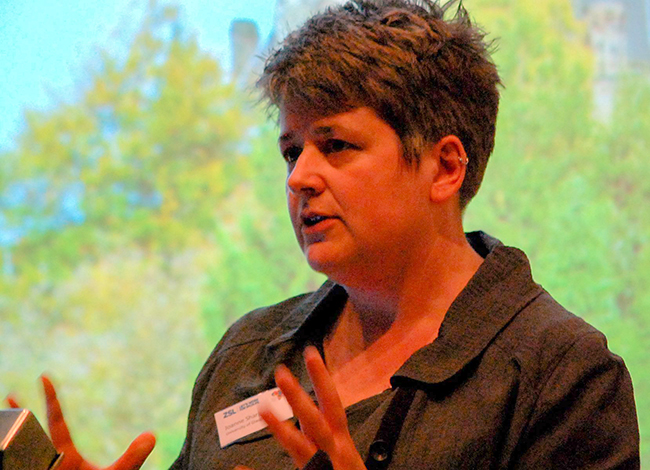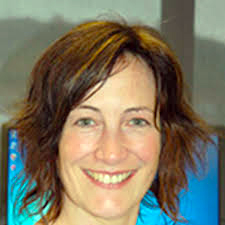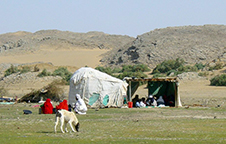Wednesday 23 October 2019 10:01am

Professor Jo Sharp
Similarities with her native Scotland may have added to Otago’s appeal, says Professor Jo Sharp but the main drawcard was the promise of wide-reaching collaborations with academics from multiple disciplines.
At Otago as the 2019 William Evans Fellow in the School of Geography, Professor Sharp is a leading human geographer from the School of Geography and Sustainable Development at the University of St Andrews, Scotland.
Geography Senior Lecturer Sophie Bond says Professor Sharp’s research interests are in political, postcolonial and feminist geographies, and she is currently working as part of an interdisciplinary team of epidemiologists, vets, modelers and social scientists to understand the key drivers and impacts of zoonotic disease in northern Tanzania.

Dr Sophie Bond
“Having Professor Sharp here through the Fellowship is a major coup for Geography because her work underscores the value of multidisciplinary approaches to research, which can be something of a rarity in this field,” Dr Bond says.
Professor Sharp has previously undertaken interdisciplinary research with social and natural scientists in the UK, Egypt, and Tanzania, and is a social scientist working on zoonosis – the transmission of disease from animals to humans.
“I have been working with Otago researchers for the past 10 years and having the chance to spend time with them in person is great. There is a lot of expertise in Africa and in geographies of environment and development in the School of Geography. Also, given the links with Scotland, and especially to Edinburgh where I live, Dunedin is particularly special.
“My partner, Val McDermid, has joined the Centre for Irish and Scottish Studies as a visiting professor, which really does make this the perfect place for us both to spend some research time.”
While here, Professor Sharp will have “a number of projects on the go” – the research covered in her upcoming Ron Lister Public lecture on Wednesday 30 October has generated a “huge amount of data” and she is taking full advantage of working with collaborators in the Otago Global Health Institute. She also plans to analyse field data and write a second edition of her 2009 text “Geographies of Postcolonialism”.

Working with Bedouin women in Wadi Allaqi, southeastern Egypt (Photo: John Briggs)
“I am very conscious that the first edition was dominated by Anglo-American literature and I want to ensure that the new edition includes a broader literature. I have a lot to learn from the de-colonial literature and practice from New Zealand scholars and activists.”
Her interest health and development started about 20 years ago, when she was involved in research in southern Egypt with Bedouin communities about their understanding and management of natural resources.
She is currently involved in leading the interdisciplinary One Health research on the socio-economic drivers of zoonotic disease transmission in Tanzania, where neglected bacterial zoonotic pathogens, such as Leptospira, Coxiella and Brucella, account for 11 times more febrile hospital admissions than malaria.
Working as part of this diverse team has presented challenges – such as various researchers using different concepts and academic ‘languages’ – but over time, the group has developed an effective way of working together.
“Sometimes people see interdisciplinary research as a process where lots of different approaches come together harmoniously in a singular answer. My experience is that interdisciplinarity is much more fractious and disruptive than this – and it’s when the different components of the research come up with different answers that I think we get new insight.”
She says differences can occur when focus group answers are different to what people are saying in questionnaires, or are different from what the analysis of health measures indicates.
“I don’t think this is a problem – instead this is showing us where the interesting issues lie. I will be exploring this in my talk – the conventional One Health approach suggests one particular intervention as a way of dealing with the problem of one of the zoonotic diseases we are studying, but the analysis of our qualitative data suggests this might not work at all.”
The 2019 Ron Lister Public Lecture
Professor Sharp will give the Ron Lister Public Lecture, entitled “Now diseases have become many!”: social and environmental drivers of health and development in Northern Tanzania” on 30 October 2019, 5:30pm Moot Court.
The talk will cover results from an interdisciplinary One Health project about the drivers of disease in livestock-keeping communities in northern Tanzania. One Health approaches – like geographical ones – recognize the need to understand the interplay of environmental and social processes to explain (and mitigate) some of the most significant health and development challenges facing us today.
“In the talk I will explore the impacts of changing social and environmental conditions on patterns and practices of livestock management, the implications of this for animal and human disease risk, and ways in which livestock keepers themselves understand these changes.”
The William Evans fund of the University of Otago was established by the University Council in 1946 under the will of the late Dr William Evans, who directed that a trust fund be established for the promotion and encouragement of learning.
